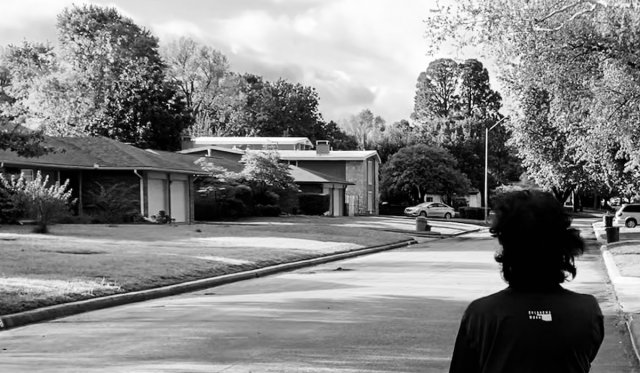
4.21.20
Norman
Gray days are the hardest.
On days when the sun shines, we are out walking, dogs on leashes, mothers and dads pushing strollers, helmeted kids racing ahead on kick scooters or wobbling behind on their small white and pink bikes. On days when the sun shines, you could believe that right now is the most benevolent time. We’re so full of kindness. We’ve abandoned our videogames and TVs, our soccer practice and hectic schedules, we’ve come outside for light and air. We smile.
Graciously, and without comment, we cross to the other side of the road when we see someone coming toward us. It’s a nice neighborhood. Kids play on tree swings in their front yards. Teens walk with their parents and don’t scowl or look at their phones. We’ve stepped back in time, or leapt forward. We have a sense that we belong to something, this neighborhood, our community; we feel that somehow, in the midst of so much darkness, there is light. We know we are the fortunate ones.
On gray days, though, it feels like this will go on forever. The past blends with the endless now, with an uncertain future we can neither dream nor believe. On gray days we spend too much time on Facebook and Twitter, we rage at the machine, at politics, at the dolts we knew in high school who keep posting right-wing conspiracy anti-science shit. We fly into a fury at nothing. Reach out to friends we’ve not heard from nor thought of for years. Crawl into a shell of seclusion. Scrub the baseboards, mop the floors with vinegar till the whole house smells like Easter eggs.
On gray days we grieve our lost dead. The past filters through, unbidden. You remember a sweating iced-tea glass on your grandmother’s kitchen table, the slant of light on the Illinois River, your mother holding up to the air and fanning her freshly polished nails. You remember the girl in third grade you made cry in class, the trip to California, your father’s laugh. Your first love, first cigarette, first kiss. The last time you hugged someone who did not live in your own house.
You look at images of the empty streets in Rome and Paris, the silence of New York City, where you once lived. Scroll through pages and pages of obituaries, read other families’ stories, people you don’t know and will never know but you know you belong to that community too. You call your sisters. You think how very cruel it is that this time when we need each other most is the very time we cannot be together. On gray days you sit on the couch with your morning coffee and weep.
On gray days you text your beloved ones in Brooklyn: How is Mama in the hospital in Queens? Not good. Not good. You mourn your actor friend who died, celebrate your friends who survived. You read how the virus is raging through Indian Country, your chest clenches, your heart aches. You thank the woman at the checkout counter at Homeland, tell her how grateful you are. We’re grateful for your service. What people say to servicemen in uniform at airports. But the airports are nearly deserted, waiting areas and walkways hollowed out, echoey. Ghost planes fly empty. In the grocery store parking lot you peel off and throw away your disposable gloves.
Your friend in prison is on lockdown, restricted to her bunk 23 hours a day. She’s worried, she says, when she finally reaches you. They all are. If the virus comes in, it will sweep through like wildfire. Like it is sweeping through black and brown communities in cities all over. Like it will sweep through the small white town in rural Oklahoma where your family lives, as soon as it gets the chance, and no hospital for miles, no health care, just the dollar store to pick up Tylenol. On gray days you’re afraid for people you love.
* * *
But tomorrow, or the next day, the sun will shine again. You’ll emerge from seclusion, step outside for a walk. Smile at the neighbors and wave. We’ve lived through so much already, crippling ice storms, prolonged power outages, blizzards, the shock and sudden silence after 9/11, the eerie quiet in the streets of Oklahoma City after the bombing. We’ve seen the devastated aftermath of tornadoes. The killing force of fire and drought and wind.
What is strange now is how normal the world is.
And not.
Nothing is normal. In the distance the bells in the university tower peal out the state’s theme song. We know we belong to the land. And the land we belong to is grand. A block over there’s the rippling waterfall sound of children’s laughter. A dog barks. Irises bloom. The sun shines.
(Editor’s note: This is the first installment in a series of pandemic diaries by Oklahoma writers. Read the rest of the series here.)





















